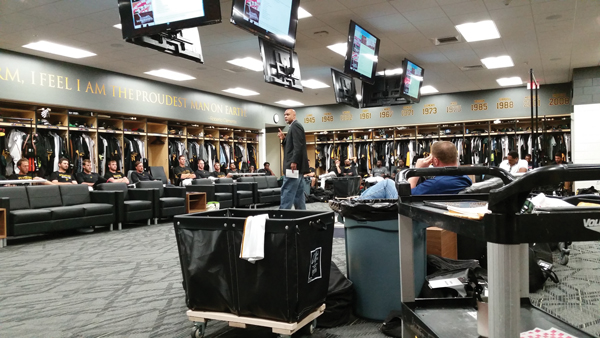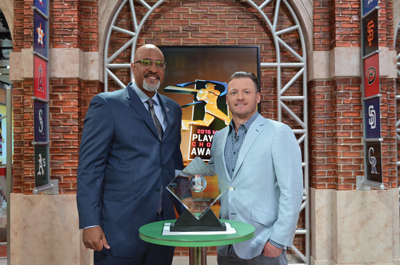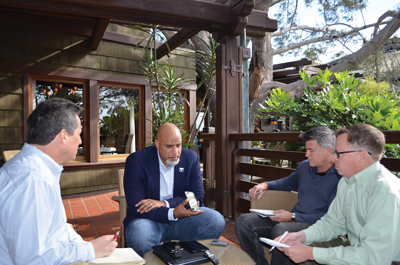Tony Clark doesn’t rattle sabers.
Clark, a former MLB power hitter now facing his first major labor negotiations after a little more than two years as the executive director of the MLB Players Association, speaks carefully and thoughtfully. He measures his words.
“We are prepared to have a very thorough negotiation on any and all issues,” he said recently. “We remain hopeful, in light of the success that the industry has had — and both ours and management’s role in that success — that we can have a very respectful and very positive negotiation.”
The MLB collective-bargaining agreement will expire Dec. 1, and the MLBPA and MLB will sit down for formal negotiations sometime early this year. But Clark, who sat down for an interview of more than an hour recently at the union’s annual meeting in San Diego, is not making any promises to reach a settlement without a work stoppage, as the league and the union have done for two decades. What he will say is that there may be difficulties, but that MLB players are strong — in fact, stronger than they ever have been.
 |
Clark talks with Pittsburgh Pirates players during last season’s spring training.
Photo by: MLBPA
|
“Even though in the years we got deals done, and even though we had labor peace for 20 years, [that] doesn’t suggest that there aren’t challenges. There will be challenges,” Clark said. “But we’ve been able to work through them. At the point that we aren’t able to work through them, our players understand the responsibility that they have.”
LARGER THAN LIFE
Strength is an attribute that has long been associated with Tony Clark, and everyone who knows him remarks on what an imposing presence he is. Clark stands 6 feet 7 inches tall. A two-sport athlete, he played basketball in high school and college before focusing on baseball.
He was a first baseman and switch hitter and played for six major league clubs from 1995 to 2009. He was an All-Star in 2001 and was third in Rookie of the Year voting in 1996. Clark was a player rep every year he was in the majors and, later, was one of two association reps. But Clark’s presence goes well beyond his physical size.
“He is a very intense person; he is a very articulate person,” said Steve Fehr, special counsel to the NHL Players’ Association, who for many years had the same role at the MLBPA. “When he speaks, people listen, and, more importantly, players listen.”
Fehr remembers a time in the 2011 CBA negotiations when Clark was working as director of player relations and, as happens, there was a “difficult” meeting internally, involving staff and players. Clark was clearly troubled by it, and spoke for 20 minutes.
“He was spellbinding, like an old-style fire-and-brimstone preacher,” Fehr said. “He spoke about what he thought we needed to do, and made plain his unhappiness with some things he had heard from some in the room. Every eye in the room was on him and you could not hear a sound other than his voice.”
The speech cleared the air and the problem. The next day, Fehr said, he asked Clark whether he had thought about what he was going to say or just did it extemporaneously. Clark just smiled.
 |
MLBPA general counsel Dave Prouty says Clark is a quick study and a shrewd judge of character..
Photo by: MLBPA
|
Free agent pitcher Jeremy Guthrie, one of MLBPA’s association representatives, said that Clark is well-prepared, knowledgeable, a good speaker and a good listener. He is able to explain union lawyers’ positions to players and vice versa, Guthrie said.
“He is a powerful communicator of information,” Guthrie said. “When he gets riled up, he can be fired up as well. If there is something said that doesn’t sit well with him, he can fight back in an aggressive way, but also in a constructive way.”
MLBPA general counsel Dave Prouty says Clark possess an array of qualities that make him “absolutely” the best person to lead the MLB players.
As well as being articulate, Clark is a quick study and a shrewd judge of character, Prouty said. He works hard and can relate to all kinds of people, not just players.
“That’s the thing about leadership — it’s hard to put your finger on it,” Prouty said. “He was a presence right away — a presence in the locker room, a presence at our board meetings. He is just one of those guys whose leadership qualities and charisma shine through.”
WEINER’S COUNSEL
Prouty, who joined the MLBPA in 2008, had been rumored as a candidate for executive director when Clark’s predecessor, Michael Weiner, was dying of cancer. But Prouty said that he did not want the job and that he and Weiner, a friend of his since they both attended Harvard Law School, had a frank conversation about it.
“He said, ‘Well, let’s talk about the next executive director.’” Prouty related. “And I said, ‘I have a candidate.’ And he said, ‘So do I.”
“And Michael said, ‘You go first.’ I said, ‘Tony Clark.’ And he said, ‘I 100 percent agree.’”
Weiner, who died Nov. 21, 2013, at the age of 51, was Clark’s mentor. He’s the one who created the job of MLBPA director of player services and persuaded Clark to take it in 2010. Clark was officially voted in as MLBPA executive director Dec. 3, 2013.
Clark remembers the day that Weiner told him about the brain tumor and the grim prognosis. It was July 30, 2012. (Weiner announced publicly that he was undergoing treatment for brain cancer on Aug. 21.)
“I personally refused to believe that it was happening,” Clark said. “I also refused to believe that he wasn’t going to be the exception to the rule, He was Superman to me, on a number of levels.”
But as the months went by and Weiner’s condition worsened, Clark allowed himself to be considered as a candidate to succeed Weiner. And in the last few weeks of Weiner’s life, Clark spent as much time as he could with him, asking questions and listening. He asked him about all of his plans for the union.
“I wanted to make sure I had an understanding and appreciation of them, so perhaps I could do them in his stead,” Clark said. He also asked him about the history of the MLBPA, the people and the relationships between the people and what to look out for in the future.
The MLBPA is considered the toughest union in sports. It is the only league without a salary cap, because players stuck together and fought against it. Players are educated on the history of their union and their place in that history, and that, Clark says, is the reason for their success.
“Our players understand there are certain principles that the organization was founded on,” Clark said. “They understand that there is a very real connection between them, those who came before and those who are coming next. And, they understand the responsibility they have as a link in that chain.”
There have been more than 19,000 players who have worn an MLB uniform.
“I am number 14,374,” Clark said, in a nod to understanding the game’s history. “That is my number. I am the 14,374th player that wore a major league uniform.”
MORE CONNECTED THAN EVER
Clark was hired by Weiner in 2010 because Weiner wanted players to be more connected to the union and more educated on its history, Clark said.
That may seem surprising to some, as the MLBPA has a reputation of involving more players on issues than any other sports union. Its bargaining sessions with MLB commonly involve 20 to 30 players sitting at the table.
 |
Clark has grown comfortable with his many roles, from handing out awards such as Player of the Year to Josh Donaldson (above) or sitting down to chat with members of the media.
Photos by: MLBPA |
“Ironic enough, there was a need, and Michael recognized it,” Clark said. “You can appreciate that a FedEx package that had 25 pieces of paper in it that was left on a player’s chair was nowhere near as effective now as it would have been in the past.”
The MLBPA has a number of electronic and social media forms of communication with players, including an app through which it communicates with players in both English and Spanish. “We are more connected to the players than
ever before,” Clark said.
Clark’s first hire was former MLB slugger Dave Winfield, who, like himself, is a towering figure at 6-foot-6, and who, like Clark, was a player leader most of his Hall of Fame career.
Winfield was hired as special assistant to the executive director in December 2013, days after Clark was voted in as executive director.
As a player, Winfield went through five work stoppages.
“I probably lost more money than anyone else,” Winfield said, adding that longtime former MLBPA attorney Gene Orza told him as much.
As strong as the union was then, Winfield says he believes it is stronger now because of the communication system that Clark has installed, as well as Clark’s working tirelessly to talk to every major league player.
“We didn’t have staff in players services who are texting the players every day,” Winfield said. “I know the executive director never made as many trips to see the players as Tony has done. That is a fact.”
Like Clark, Winfield would not make any predictions about what the owners might do or if there would be a work stoppage. “We will see,” Winfield said.
And like every MLBPA leader, Winfield said everything comes down to how unified the players are.
“Both sides are feeling each other out now,” Winfield said. “The commissioner’s office and the staff do not know Tony right now. … [Clark] is ushering in a new era for the players association right now, and the players feel it. MLB will see it.”
NO STRANGER TO MANFRED
Just as this will be first time that Clark leads negotiations for the players, it also will be the first time that Rob Manfred, who officially took over as MLB commissioner last January, will lead the talks for MLB owners.
Manfred and Clark are no strangers to each other. When Clark was a player rep and an association rep during his playing days, Manfred was MLB’s lead labor executive and attorney.
Clark said that his relationship with Manfred is good and that they speak on a variety of topics, in person or on the phone, all the time.
“Tony and I have a longstanding and productive relationship,” Manfred said in an email. “We speak frequently on issues of mutual interest. He is a well-informed and passionate representative of the interests of Major League Baseball Players. At the same time, he makes an effort to work cooperatively with our office.”
Since Clark has been executive director and Manfred has been commissioner, they have already successfully bargained agreements on a number of initiatives, side issues to the basic agreement, as they call the CBA in baseball. Those initiatives include changes to the pace of the game, a youth initiative, changes to the home-plate rule and a comprehensive policy on domestic violence and sexual abuse.
The domestic violence policy, announced last year, came after 11 months of bargaining, after both sides consulted with more than 20 experts.
What they have come up with, Clark said, is something that both sides felt treated the victims, as well as those accused of abuse, fairly. But it wasn’t easy.
“It was the most challenging [negotiation], because I think both sides entered the conversation ill-equipped to really have it,” Clark said.
THE PAST AND THE FUTURE
Work stoppages in sports, and in other industries, invariably come when one side or the other proposes major economic changes to the system. Asked whether MLB has asked for such changes, Clark said, “Not at this point.”
Clark stays true to his quiet, yet forceful style when looking toward the next CBA negotiations. He’s not going to speculate if MLB players are ready to strike or endure a long lockout. “I am not going to create something that doesn’t exist,” he said. “Our group understands the responsibility they have. How that manifests itself is going to be a result of how the negotiations go.”
He also is unwilling to discuss his key issues or even opine what the core issues may be in the upcoming negotiations. At least not publicly, which is consistent with his approach.
“One of the things we have collectively learned, particularly in this information-centric climate, [is that] being able to have dialogue and conversation, without standing in front of a podium every other day to suggest the latest and greatest, adds value to the negotiation itself,” Clark said. “Whether it’s informal or not, you won’t hear me talk about much publicly. You just won’t.”







